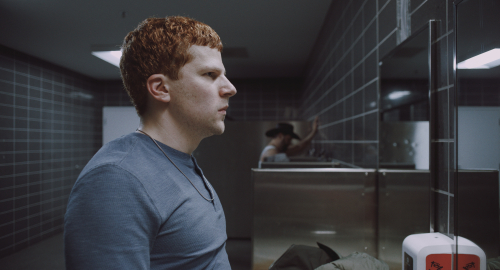
Wyatt Garfield
MOVIE REVIEW
Manodrome (2023)
If the pitch for “Manodrome” wasn't “ ‘Taxi Driver’ meets ‘Fight Club’ ” someone should be fired. What movies have better depicted a crisis of American masculinity than those two? But the key difference is that both of those movies knew what they were fighting for. “Manodrome” doesn't. It doesn’t know what it wants. It doesn't even know who to blame for the mess it’s in. Its incoherent hatred is an accurate reflection of the sickeningly violent and misogynistic ethos that is flooding social media and the minds of teenage boys all over the world. But real-world accuracy and production values worthy of the Berlinale don’t necessarily make a movie good.
Ralphie (Jesse Eisenberg, a surprising casting choice, which is the whole point) lives in his childhood home in suburban New York with his blue-haired girlfriend Sal (Odessa Young doing her best in a nearly unplayable part). What is up with those names? This isn't a period piece. Sal is heavily pregnant and still working long shifts at a convenience store. Ralphie's mother is dead; and his father walked out years ago; Sal's family isn't directly mentioned though – it’s obvious they weren’t prizewinners either. Ralphie recently lost his job, so now works as a ride-share driver and regularly attends a hardcore weightlifting gym. It has a nasty vibe which perfectly matches his mood. But nothing is helping him feel better and the future looks bleak, all the more so with a little mouth soon to feed. He buys his pills from an affable dude named Jason (Philip Ettinger), who offers to introduce him to some dudes who helped him through a similar rough patch. The dudes move in a pack, led by Dan (Adrien Brody, creepy AF); and it transpires that they are basically a cult, with Dad Dan as the leader and the owner of the large and fancy house in which they all live.
The parameters of the cult seem to involve three things: the member have all taken a vow of celibacy, have a triangular symbol branded on their bodies, and in moving in with Dad Dan have otherwise dropped out of their lives. They still work and go to the gym and hang out at the mall, but the core of their lives is the group and the validation they get from it. In their regular meetings they rant a lot about women and capitalism in the most vulgar language, and say a lot of nice things about each other. But that’s all it is. To paraphrase “The Big Lebowski,” say what you will about “Fight Club,” but at least it's an ethos.
Money is never mentioned, except Dad Dan and the others have a lot of it and Ralphie doesn't. He veers between being delighted by their acceptance of him and fury that aligning himself with them means rejecting Sal and the baby. The cult’s only purpose seems to be telling its members what they want to hear; and their personal validation of Ralphie meets a deep need that his relationship with Sal and imminent fatherhood doesn’t come close to. He is nothing except a bottomless pit of hurt; and he doesn't know what he wants, or even who he is outside of that, which makes him incredibly dangerous. With the group Ralphie admires a $200 shirt at the mall, and under their encouragement buys it. He then has the cold realization that spending money he doesn’t have on himself when he’s days away from parenthood means he is actually a giant asshole; and he causes a scene which Dad Dan manages to calm, but it’s ugly. But the shirt (of all things, a yellow polo neck) represents Ralphie's desperate need to be praised and loved; and these damaged, frightening men are the only people who meet that need. Well, except a man from the gym (Sallieu Sesay) whose part must not be spoiled. This is deeply unfair to Sal, of course, but knowing that doesn’t change a thing. In fact, his unfairness to Sal only makes Ralphie angrier, and since he has no self to get angry at, he must find other outlets for his rage.
Writer-director John Trengrove clearly made the movie to delve into this incoherent male rage, but Ralphie can be mad at the world without resorting to the bigotry he demonstrates in his car (the most direct “Taxi Driver” parallel), or in the way he starts treating Sal. And Sal is not to blame for his parents' choices, or his lack of money, or the parlous state of American capitalism. On the other hand, no one else is in slapping distance. It's possible to hate yourself without committing acts of violence and it's possible to lash out against the world without committing hate crimes – unless the bigotry was there all along, of course. Sadly the movie skips over directly addressing that mindset, either in Ralphie or in the cult, without skipping the violence, of course.
As a result the entire third act is a bore, mostly because the current American imagination seems utterly unable to understand acts of kindness require greater heroism than acts of violence. The senselessness on display will undeservedly get much more attention than Gheorghe Murensan’s utterly crucial (and deeply weird) role at the end. Of course none of the actors involved, even Mr. Eisenberg a good decade too old for his part, could pass this up. But why go to all the trouble of making a movie about men who hate women when no other solutions are offered? There are other ways to fuck the world than with a dick or a gun, but “Manodrome” doesn't know it, which means the creeps and losers who'll be attracted to this movie won't learn it either.
Comments